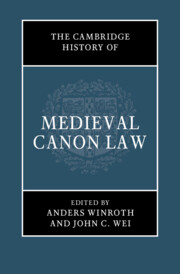Book contents
- The Cambridge History of Medieval Canon Law
- The Cambridge History of Medieval Canon Law
- Copyright page
- Contents
- Figures
- Maps
- Tables
- Contributors
- Acknowledgments
- Abbreviations
- Medieval Canon Law: Introduction
- Part I The History of Medieval Canon Law
- Part II The Sources and Dissemination of Medieval Canon Law
- Part III Doctrine and Society
- Iudicium
- Clerus
- 18 Ecclesiastical Property, Tithes, Spiritualia
- 19 The Law of Benefices
- 20 Religious Life
- 21 The Sacraments of Baptism, Confirmation, and the Eucharist
- 22 Confession, Penance, and Extreme Unction
- 23 Saints and Relics
- Conubium
- Crimen
- Conclusion
- Bibliography of Primary Sources
- Index
- References
20 - Religious Life
from Clerus
Published online by Cambridge University Press: 13 January 2022
- The Cambridge History of Medieval Canon Law
- The Cambridge History of Medieval Canon Law
- Copyright page
- Contents
- Figures
- Maps
- Tables
- Contributors
- Acknowledgments
- Abbreviations
- Medieval Canon Law: Introduction
- Part I The History of Medieval Canon Law
- Part II The Sources and Dissemination of Medieval Canon Law
- Part III Doctrine and Society
- Iudicium
- Clerus
- 18 Ecclesiastical Property, Tithes, Spiritualia
- 19 The Law of Benefices
- 20 Religious Life
- 21 The Sacraments of Baptism, Confirmation, and the Eucharist
- 22 Confession, Penance, and Extreme Unction
- 23 Saints and Relics
- Conubium
- Crimen
- Conclusion
- Bibliography of Primary Sources
- Index
- References
Summary
The term religio, like many others in the technical vocabulary of the medieval Church, had more than one meaning. Since the early Middle Ages, it had denoted monastic observance, the life lived by the “regular” monk or nun, but it could also be used to refer to a more general dedication of one’s life to God – the latter meaning in no way eclipsing the former. Bishop Jacques de Vitry (d. 1240), for example, employed the term in his defense of beguines: “We do not consider religious only those who renounce the world and go over to a religious life, but we can also call religious all the faithful of Christ who serve the Lord under the one highest and supreme Abbot.” And this usage was not restricted to spiritual directors who saw the merits of a more interiorized form of religious life.
- Type
- Chapter
- Information
- The Cambridge History of Medieval Canon Law , pp. 396 - 403Publisher: Cambridge University PressPrint publication year: 2022

